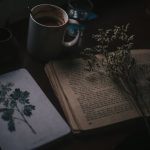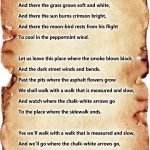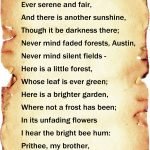As I listened from a beach-chair in the shade
To all the noises that my garden made,
It seemed to me only proper that words
Should be withheld from vegetables and birds.A robin with no Christian name ran through
The Robin-Anthem which was all it knew,
And rustling flowers for some third party waited
To say which pairs, if any, should get mated.Not one of them was capable of lying,
There was not one which knew that it was dying
Or could have with a rhythm or a rhyme
Assumed responsibility for time.Let them leave language to their lonely betters
Who count some days and long for certain letters;
We, too, make noises when we laugh or weep:
Words are for those with promises to keep.
Their Lonely Betters embodies everything I love about Auden’s work; it employs a traditional, rhyming form, but loses none of its poetic ease or beauty. For me, this shows the real mastery of Auden as a poet; nothing is ever forced, with his writing. He sweeps calmly and majestically through these four verses, ending on a neat and poignant final line that leaves you desperate to read the whole thing again.
The poem explores the differences between ‘natural’ beings in the garden – the “vegetables and birds” – and humans with all their artifice. I love the unassuming, understated opening. Auden expresses his feeling that words should be “withheld” from the creatures in his garden. It is as though he does not want to contaminate the innocence of nature with the ‘man-forged manacles‘ of language. He mentions the robin “with no Christian name”, singing its “Robin-Anthem which was all it knew”. This line reminded me of Mary Oliver’s The Kingfisher. In that poem, Oliver talks about the bird’s “rough and easy cry/ I couldn’t rouse out of my thoughtful body if my life depended on it”. It is the sound of pure instinct – the essence of life un-muddled by thought.
The mention of the birds mating, and how simple it is without the sometimes deceitful mask of language, adds a tint of bitterness to this poem. Auden’s love-life was rather rocky, and I get a sense of real pain in his expression of how language and its inclination for telling lies confuses natural instincts in this poem. We are forever questioning and imagining and longing for other places, other people; we are never content. Of course, this can be both a blessing and a curse.
In the third verse, Auden reminds us that not one of the birds in his garden is “capable of lying” or knows that it is “dying”. They have no awareness of their mortality, and they do not tell lies. Is there a link between these two facts? Do we lie – do we write fiction – because we know that we are dying? I am certain our impulse for storytelling comes partly from our awareness of death; we want to pass on memories, make sense of our lives and distract ourselves from reality. As Auden says, none of those birds could “with a rhythm or a rhyme” assume “responsibility for time”. I just love those two lines. I love the idea of poetry being an act of assuming responsibility for time. For that is, in a sense, what we do when we write poetry — we are playing God.
As we enter the final stanza, Auden says “Let them leave language to their lonely betters”. This sums up the whole poem, for me. The birds will keep their happy innocence, and their “lonely betters” – that’s us – will remain lonely, with our language – our craft of lying. Language – source of so much beauty and delight – makes us superior in so many ways to non-speaking animals. But it also complicates our lives intensely. It is through language that we betray and lie to each other; it is through language that misunderstandings arise and promises are broken. Perhaps this is because language is ultimately inadequate for expressing what we really mean.
The last two lines are unforgettable. The noises that we make when we “laugh or weep” are natural expressions of untempered emotion – they are the sounds we make when words fail us. When grief is too great, we weep, having no words to describe our pain. When we are in hysterics, we laugh, and for a moment we are relieved of thought. “Words are for those with promises to keep”. Auden ends the piece with a lovely rhyme, remarking that we need language because we communicate; we make promises; we bargain and negotiate with each other. Animals do not do this. This ending for me has a positive tint to it; it makes me feel like although language allows us to lie, and although we often break our promises and betray each other, I would rather the promises were made and the lies told, than for nothing to be said (or written) at all.
Reviewed by Emily Ardagh



